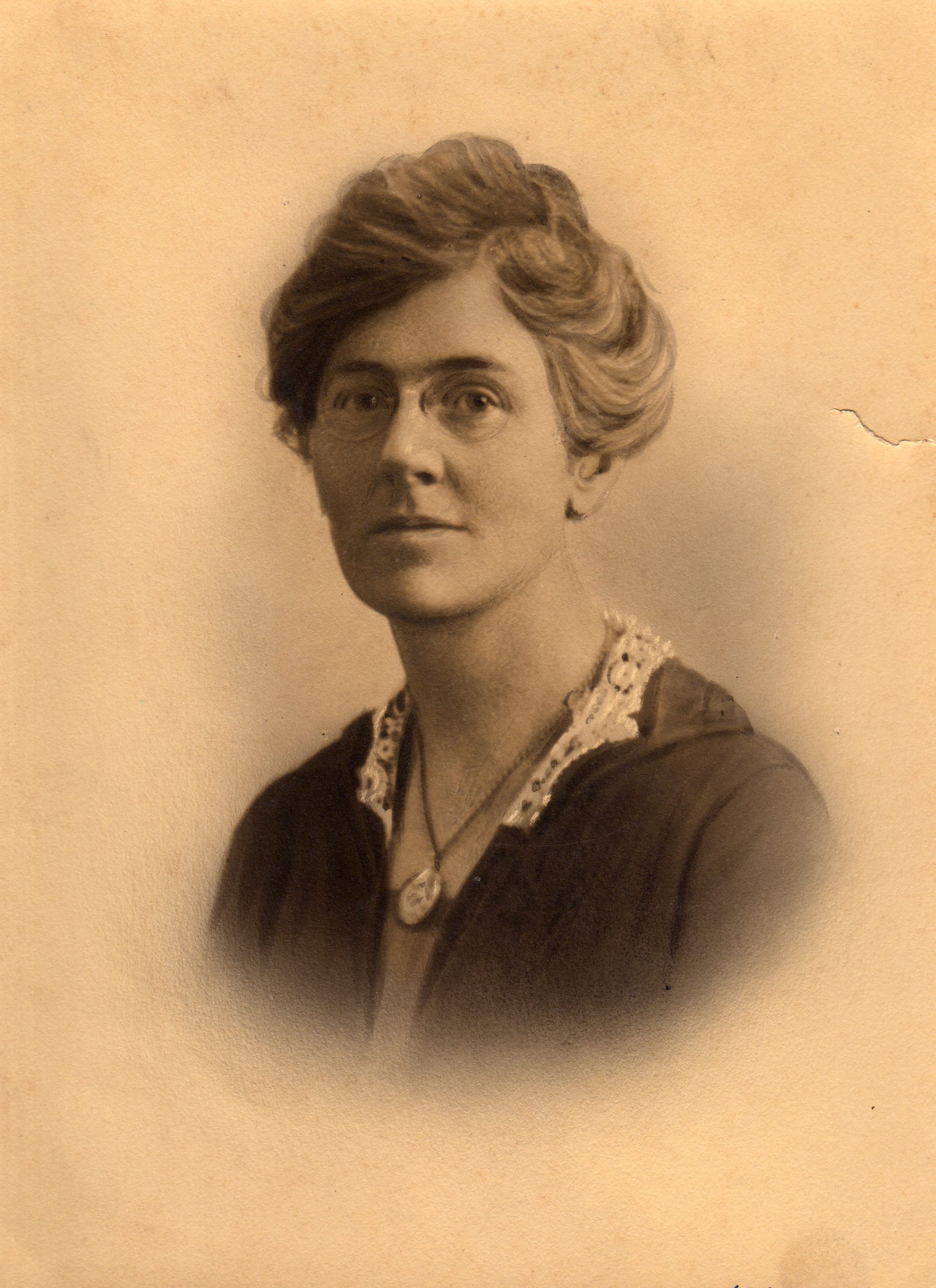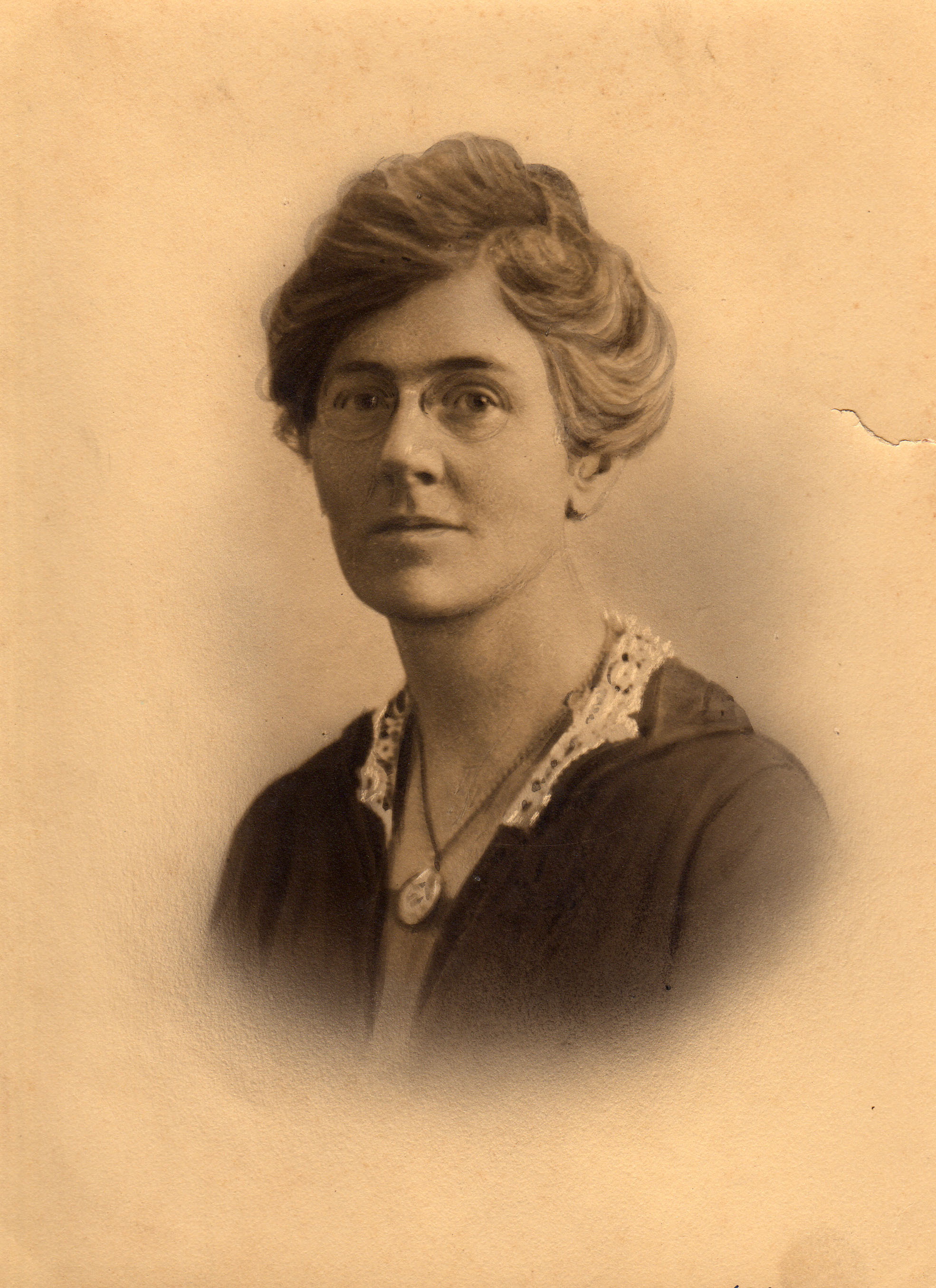
06 Jul A Tribute to Olive Dame Campbell, 1882-1954
Olive Dame was born the daughter of a middle class New England family of Mayflower descent. Her father was a talented botany teacher and school principal. A gifted mother taught her early the love of art and music. She enjoyed an active, rich youth that developed an inquiring mind and strong, determined will. These attributes would serve her well in the coming years of adventure with future husband, John C. Campbell, and later as the founder and director of the Folk School she named in his honor. Though less well known, she became one of the leading social reformers of her time.
After graduating from Tufts College in 1903, she taught literature several years before planning a vacation voyage to Scotland in 1906. On the voyage, she met John Campbell who was traveling to his ancestral homeland to recuperate from the loss of a wife and the stress of being President of Piedmont College. Olive was a smart, talented and dedicated Christian woman with a great sense of humor. She had indeed been called to serve humanity through education. In these ways, she was a lot like John. By trip’s end, they were engaged. Olive and John married in 1907 in her home town in Medford, Massachusetts.
The Campbells were among the first to recognize and appreciate the diverse character and skills the Appalachian people had developed in their extremely isolated existence. For this reason they disagreed with the prevalent stereotype of mountain people held by those of formal education at that time. They found that social workers had little understanding of the people they were sent to help, or what their real strengths and needs were. There was a void of credible information on Appalachian social conditions, and the small amount that existed was invalid. Thus, the Campbells planned to make a comprehensive study of the Southern Appalachian Mountains.
After receiving a grant from the Russell Sage Foundation, they set off on a four-year journey, (1908-1912), on horseback and by covered wagon extending over portions of eight states forming a region John later named the Southern Highlands. They visited numerous communities, schools, churches, government officials, and families in the region to inquire what the people actually wanted in the way of assistance for their social and economic development. Olive kept a detailed journal of the entire survey journey as well as collected traditional English folk songs still preserved by word of mouth in the mountain families.
Education was the most frequently given answer by the people as to their needs. They wanted education for adults who were living on the land with the intention of staying there. Schools separated students based on performance. Better performing students were furnished additional opportunity for continuing education. This further education, however, took the individual from his home to work in the city. Those who stayed to work the land were virtually unschooled.
The Campbells had read about the Danish folk schools that provided a different kind of non-competitive education for rural adults. These schools had yielded contented, productive inhabitants on very successful farms for over 60 years. They believed the Danish model could be adapted to the Appalachian situation and enable the mountain people to live happy, productive lives in their home environment by efficient farming, cooperatives, and development of their art and craft skills. Upon completion of the Appalachian survey, the Campbells planned a year-long study of the Danish folk schools.
When the outbreak of World War I forced cancellation of their Danish trip, the Campbells continued their Appalachian work living in Asheville, N. C. During this time, Olive and John lost two infant daughters. Olive dealt with the loss by completing her ballad collecting work which lead to the publication of English Folk Songs from the Southern Appalachians by Olive Dame Campbell and Cecil J. Sharp, in 1917. Within two years John died at the age of 51 leaving Olive to fulfill their dreams. She took all of their notes to Nantucket Island and methodically compiled their survey which was published as The Southern Highlander and His Homeland by John C. Campbell, in 1921. After the war ended, the time had come to pursue the Danish folk school project.
Olive secured a fellowship for the study of adult education from the American-Scandinavian Foundation and left for Denmark in 1922 to study the Danish folk school system. She took with her a young fellow mountain worker, Marguerite Butler, who would later become her assistant in founding the John C. Campbell Folk School in Brasstown, N. C. During this time, Olive was at the peak of her health, strength, and mind for the new adventure. After eighteen months of visiting most of the 150 folk schools, the two determined ladies returned armed with enough of an intellectual and spiritual grasp, enthusiasm, and experience to implement the Danish folk school model in Appalachia. Olive’s zeal, discipline, and devotion had merged in a tremendous sense of calling to the field of mountain work. For the next few years as Olive continued her work with the Conference of Southern Mountain Workers, she and Marguerite also began the task of selecting a site for the new folk school. Additionally, she wrote and published The Danish Folk School by Olive D. Campbell. It has been called “the most understanding book on the subject ever written.”
By 1925, Olive had chosen the community of Brasstown, N. C. to locate the folk school. It was ideal not only because of the absence of competing large towns or industry, but also because the local people very much wanted the school and pledged the needed support. This marriage of school and community, though tiny compared to the whole Southern Highlands region, was destined to become a model of effectiveness and progress over the next three decades as Olive directed the school through the Depression and World War II. It had truly become an asset to the community where many of the local families were enlightened, progressive, and contented, thus allowing them to stay upon the land successfully.
Olive retired in 1946 and returned to Medford to continue her robust correspondence and draft The Life and Work of John Charles Campbell, her husband’s biography. WW II had ended, the national economy was in an upswing, and the Craft Revival in America was beginning. As always, the Folk School continued to adjust to change by considering it new opportunity. With a new mission, and through a series of new directors, the Folk School served students from a much larger area, first regionally, then nationally and internationally. Even with all these changes, the school still offers people from the local area, ways to improve their quality of life while it also provides a unique resource to a much broader base as well. The emphasis has shifted more and more to arts and crafts reflecting Olive’s guidance that “the form the school takes is always to be based on the need.” In spite of 90 years of considerable change, most of the important, underlying Danish folk school principles remain, keeping the unique institution true to the founder’s dream. In retrospect, her entire life had been preparation for this accomplishment.
Olive Dame Campbell was a gifted, selfless lady of boundless mental and physical energy. Believing in the value and uniqueness of the individual, she came to the mountains with a “listening ear.” Her goal was to stimulate creativity, cooperative effort, and personal growth that never stopped. She endeavored to bring rural life to relate to the larger world while achieving satisfaction and fulfillment. Her colleagues regarded her as one who, in all situations, could be counted on to do the best that she could do. She was known for her wise, practical, and successful approach to controversial issues. Her stated purpose of the folk school, “to awaken, enliven and enlighten a community with lifelong learning,” explains the school’s motto, “I Sing Behind the Plow”.
Rooney Floyd, Brasstown, N. C., July, 2014
Sources
1. “Mountain Life & Work
Magazine of the Southern Mountains”
No. 4, 1954
2. Appalachians Travels, The Diary of
Olive Dame Campbell, 2012
Edited by Elizabeth M. Williams
3. DVD: Sing Behind the Plow:
John C. Campbell Folk School
UNC-TV and John C. Campbell Folk School
Copyright 2008
4. File of John R. Floyd, Jr.
(Various notes from the Archives, and staff
interviews of the John C. Campbell Folk School)





Marcia Butman
Posted at 11:44h, 07 JulyThis is really great, many thanks. Are you an Olive historian?
Best Marcia, Olive’s grand neice
Dianne Mirmow
Posted at 21:33h, 12 JulyJust spent my first weekend at at the school. Great article!
Betsy Orlando
Posted at 12:53h, 29 JulyGreat article, Rooney! Way to go!